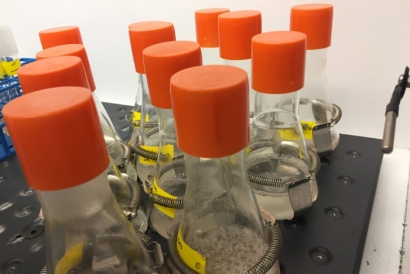
The researchers, representing a collaboration of investigators at the School of Medicine and the School of Engineering & Applied Science seek to make biofuels from a toxic waste product of papermaking called lignin.
Another goal of the project is to produce biofuels that could replace petroleum-based fuels. Today’s cars can burn fuel that contains 10-15 percent ethanol. But specialized engines are required when the fuel blend is mostly or entirely alcohol-based fuel. Renewable biofuels that are chemically indistinguishable from fossil fuels — such that they could replace current petroleum fuel within the country’s existing automotive fleet — would be a major development.
The researchers are studying a type of bacteria called Rhodococcus opacus, originally discovered growing on toxic compounds outside a chemical plant. These bacteria thrive on these toxic compounds, using them as a source of food for the production of biofuels.
“We are taking advantage of the fact that the compounds that R. opacusgrows on are not just random toxins,” Dantas said. “These compounds are related closely to lignin, complex polymers that make up roughly 30 percent of plant matter. Our team is using a combination of chemistry, systems biology and synthetic biology to try to process lignin plant matter into biofuels that can be added directly to current petroleum-based engines.”
Millions of tons of lignin are generated yearly from papermaking and lignocellulose-based biofuel industries. Currently, the value of lignin is restricted to its application as a fuel for on-site boiler operations. This project seeks to expand its uses.
The Foston lab is focused on developing chemical transformation processes that extract lignin from biomass, breaking apart that lignin into a form that can be “fed” to the bacteria.
The Moon lab is focused on optimizing the different strains of R. opacus through adaptive evolution and the use of synthetic biology tools. According to Moon, his team is developing the synthetic biology tools needed to engineer and improve R. opacus strains for fuel production.
The Dantas lab is focused on sequencing the DNA and RNA of R. opacus as it adapts to more efficiently process the raw (and toxic) biomass.
The Tang and Garcia Martin labs will use computer models and machine learning to map the interconnecting networks of genes and metabolism and predict what the microbe will do under a given set of circumstances. One little change could propagate through the network and result in multiple changes to the resulting compounds that the microbe produces.
The Zhang lab is taking the compounds made by the bacteria and processing them into refined forms of fuel that so closely resemble petroleum or diesel, they could be pumped into vehicles that are on the road today. The fuel must mimic a final product that typically requires millions of years of degradation to achieve. (See REM coverage of Zhang’s research here)
Photo: A team of Washington University researchers is engineering bacteria to manufacture biofuel. Pictured are cultures of bacterial strains that can turn toxic compounds into the precursors of biofuels.(William R. Henson)

